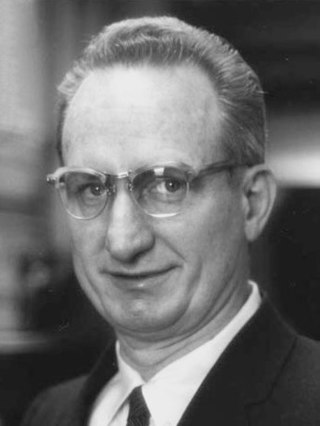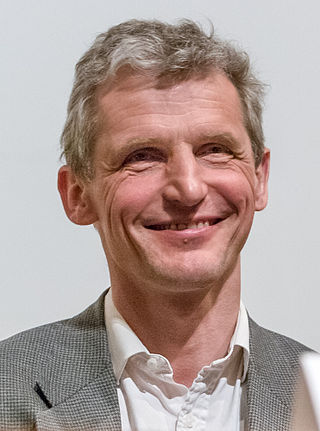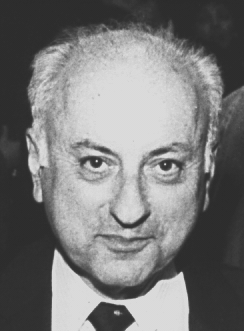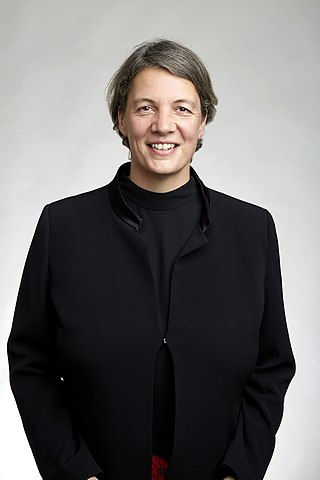Related Research Articles

Isidor Isaac Rabi was an American physicist who received the Nobel Prize in Physics in 1944 for his discovery of nuclear magnetic resonance, which is used in magnetic resonance imaging. He was also one of the first scientists in the United States to work on the cavity magnetron, which is used in microwave radar and microwave ovens.

Leo James Rainwater was an American physicist who shared the Nobel Prize in Physics in 1975 for his part in determining the asymmetrical shapes of certain atomic nuclei.

Val Logsdon Fitch was an American nuclear physicist who, with co-researcher James Cronin, was awarded the 1980 Nobel Prize in Physics for a 1964 experiment using the Alternating Gradient Synchrotron at Brookhaven National Laboratory that proved that certain subatomic reactions do not adhere to fundamental symmetry principles. Specifically, they proved, by examining the decay of K-mesons, that a reaction run in reverse does not retrace the path of the original reaction, which showed that the reactions of subatomic particles are not indifferent to time. Thus the phenomenon of CP violation was discovered. This demolished the faith that physicists had that natural laws were governed by symmetry.

Eric Allin Cornell is an American physicist who, along with Carl E. Wieman, was able to synthesize the first Bose–Einstein condensate in 1995. For their efforts, Cornell, Wieman, and Wolfgang Ketterle shared the Nobel Prize in Physics in 2001.

Deborah Shiu-lan Jin was an American physicist and fellow with the National Institute of Standards and Technology (NIST); Professor Adjunct, Department of Physics at the University of Colorado; and a fellow of the JILA, a NIST joint laboratory with the University of Colorado.

Wolfgang Ketterle is a German physicist and professor of physics at the Massachusetts Institute of Technology (MIT). His research has focused on experiments that trap and cool atoms to temperatures close to absolute zero, and he led one of the first groups to realize Bose–Einstein condensation in these systems in 1995. For this achievement, as well as early fundamental studies of condensates, he was awarded the Nobel Prize in Physics in 2001, together with Eric Allin Cornell and Carl Wieman.

Melvin Schwartz was an American physicist. He shared the 1988 Nobel Prize in Physics with Leon M. Lederman and Jack Steinberger for their development of the neutrino beam method and their demonstration of the doublet structure of the leptons through the discovery of the muon neutrino.
Daniel Kleppner is an American physicist who is the Lester Wolfe Professor Emeritus of Physics at Massachusetts Institute of Technology (MIT) and co-founder and co-director of the MIT-Harvard Center for Ultracold Atoms. His areas of science include atomic, molecular, and optical physics, and his research interests include experimental atomic physics, laser spectroscopy, and high precision measurements.
Markus Greiner is a German physicist and Professor of Physics at Harvard University.

David Jeffery Wineland is an American physicist at the Physical Measurement Laboratory of the National Institute of Standards and Technology (NIST). His most notable contributions include the laser cooling of trapped ions and the use of ions for quantum-computing operations. He received the 2012 Nobel Prize in Physics, jointly with Serge Haroche, for "ground-breaking experimental methods that enable measuring and manipulation of individual quantum systems."
Vernon Willard Hughes was an American physicist specializing in research of subatomic particles. Hughes was born in Kankakee, Illinois. During World War II, he worked at the M.I.T. Radiation Lab. He earned his PhD under I. I. Rabi at Columbia University in 1950. Hughes was notable for his research of muons which showed the existence of previously undetected matter. He was also noted for research that showed that protons have gluons and quarks. Hughes was a member of the National Academy of Sciences, Sterling Professor at Yale University, and a recipient of Rumford Prize, and a recipient of Davisson-Germer Prize in Atomic Physics and the Tom W. Bonner Prize in Nuclear Physics, both from the American Physical Society.

Michelle Yvonne Simmons is an Australian quantum physicist, recognised for her foundational contributions to the field of atomic electronics.
Mikhail Lukin ; born 10 October 1971) is a Russian theoretical and experimental physicist and a professor at Harvard University. He was elected a member of the National Academy of Sciences in 2018.
Randall Gardner Hulet is an American physicist.
Monika Schleier-Smith is an American experimental physicist studying many-body quantum physics by precisely assembling systems of ultracold atoms. Her research helps connect the world of theoretical and experimental physics. These atomic, molecular, and optical physics (AMO) engineered systems have applications in quantum sensing, coherent control, and quantum computing. Schleier-Smith is an associate professor of physics at Stanford University, a Sloan Research Fellow, and a National Science Foundation CAREER Award recipient. Schleier-Smith also serves on the board of directors for the Hertz Foundation and also works to improve education through speaking and serving on panels.

Hidetoshi Katori is a Japanese physicist and professor at the University of Tokyo best known for having invented the magic wavelength technique for ultra precise optical lattice atomic clocks. Since 2011, Katori is also Chief Scientist at the Quantum Metrology Lab, RIKEN.
The I. I. Rabi Prize in Atomic, Molecular, and Optical Physics is given by the American Physical Society to recognize outstanding work by mid-career researchers in the field of atomic, molecular, and optical physics. The award was endowed in 1989 in honor of the physicist I. I. Rabi and has been awarded biannually since 1991.
Chris H. Greene is an American physicist and the Albert Overhauser Distinguished Professor of Physics and Astronomy at Purdue University. He was elected a member of the National Academy of Sciences in 2019.
Francesca Ferlaino is an Italian-Austrian experimental physicist known for her research on quantum matter. She is a professor of physics at the University of Innsbruck.

Gretchen K. Campbell is an American atomic, molecular, and optical physicist associated with the National Institute of Standards and Technology. She works in the field of atomtronics and has received awards in recognition of her research contributions on Bose-Einstein condensates. She is currently on detail to the White House Office of Science and Technology Policy (WHOSTP), where she is the Assistant Director for Quantum Information Science at WHOSTP, and Director of the National Quantum Coordination Office (NQCO).
References
- ↑ "Martin Zwierlein". aps.org. Retrieved April 22, 2017.
- 1 2 "Martin Zwierlein". mit.edu. Retrieved July 21, 2019.
- 1 2 "Martin Zwierlein" . Retrieved July 21, 2019.
- ↑ "2017 I.I. Rabi Prize in Atomic, Molecular, and Optical Physics Recipient" . Retrieved July 21, 2019.
- ↑ "TOPTICA BEC Junior Award 2021" . Retrieved September 17, 2021.